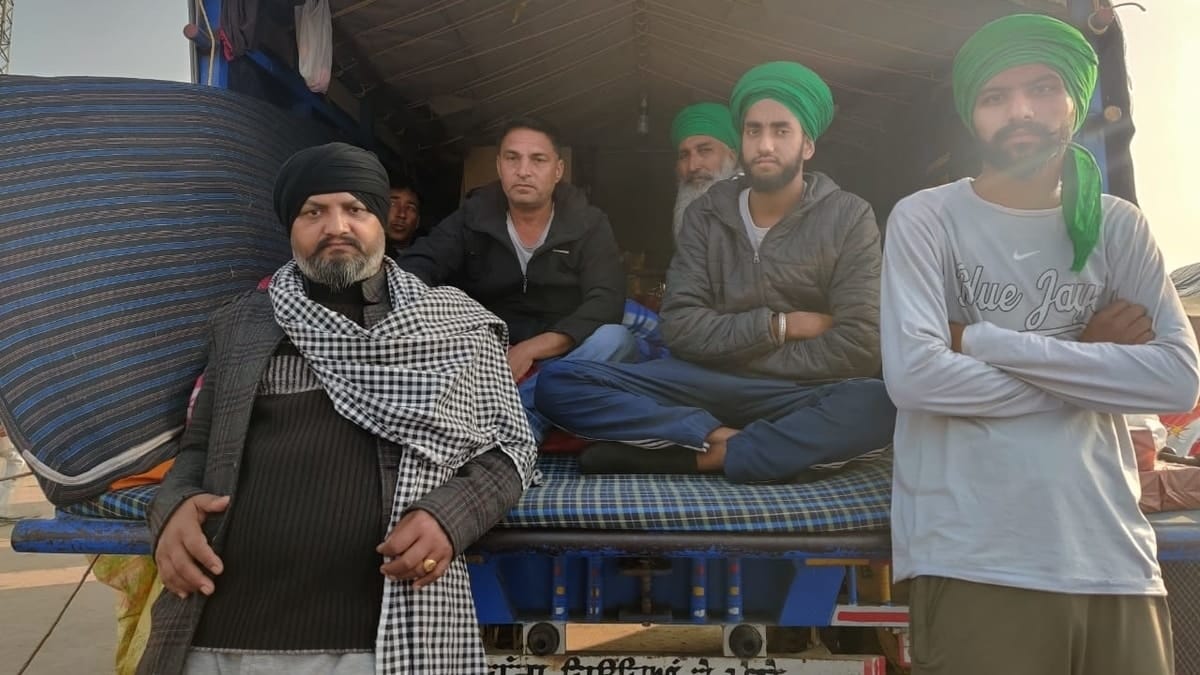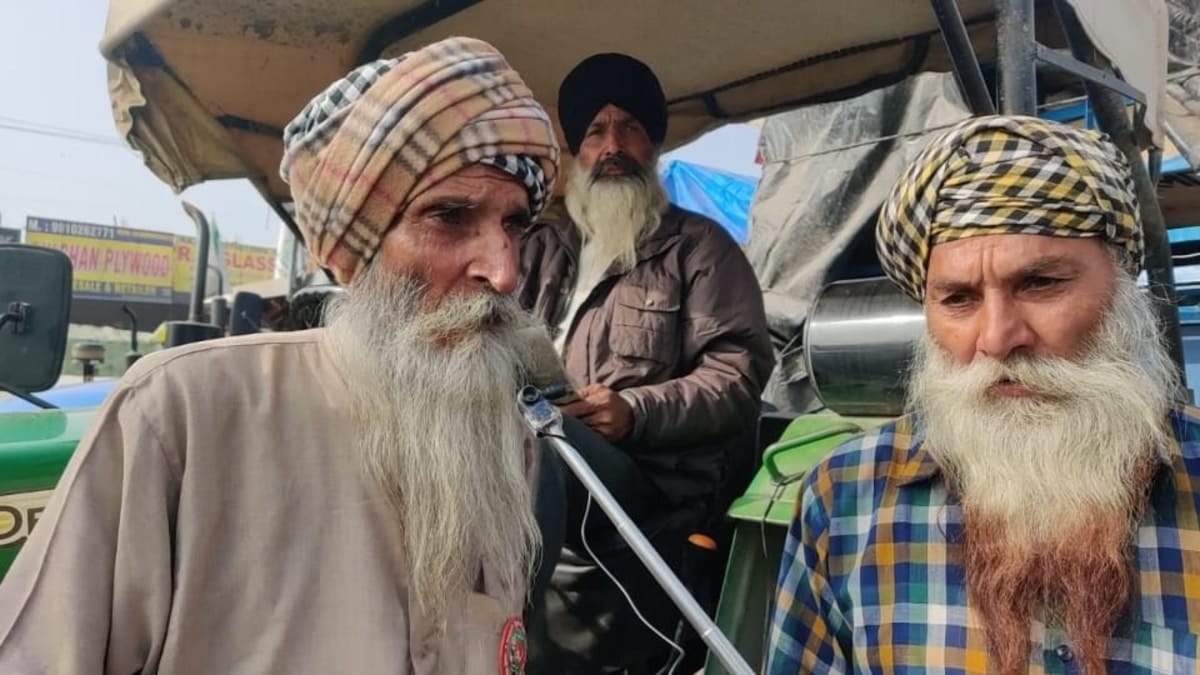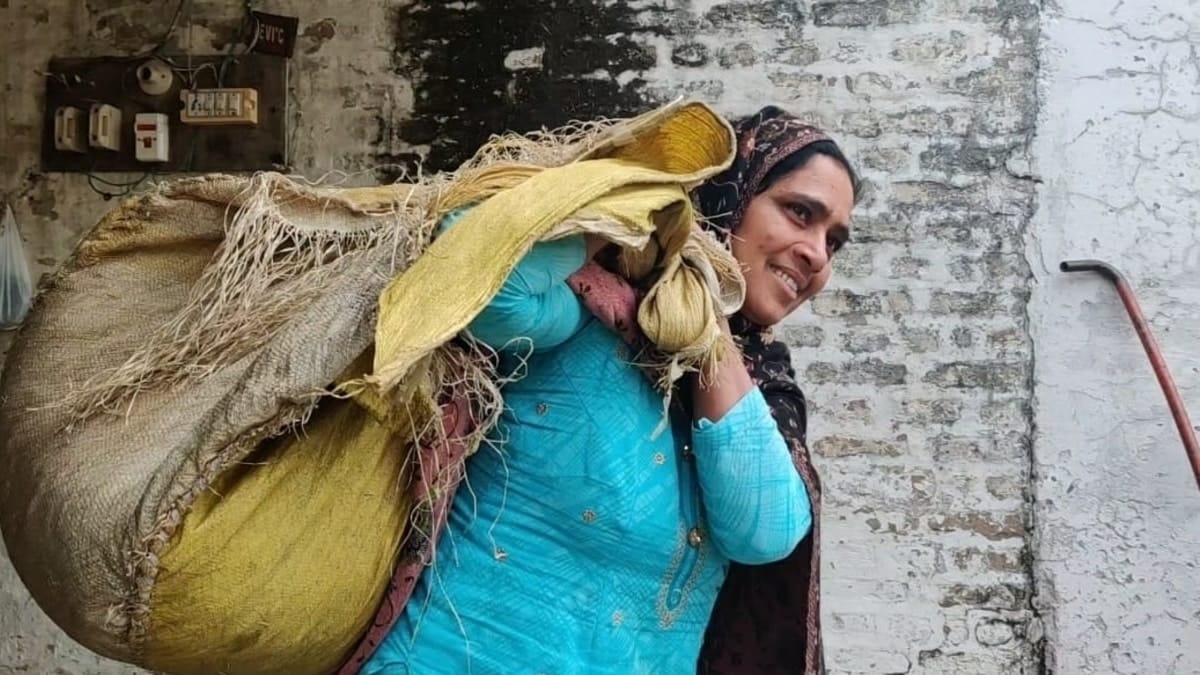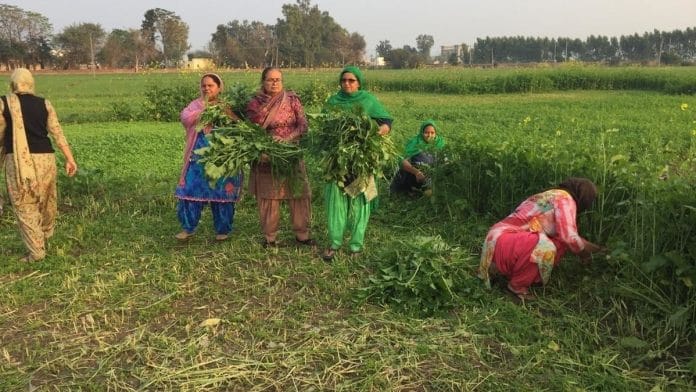Patiala: In the Chabbewal village of Punjab’s Hoshiarpur district, Parminder Singh rushed an old woman to a nearby charitable hospital in the early hours of Wednesday. The partially paralysed woman needed urgent consultation. Parminder was apprehensive as she had had a seizure late in the night and this was the first time he was accompanying her for a check-up.
Unrelated to the woman, Parminder was simply standing in for Chivranjan Singh, the woman’s son who is stationed at the Singhu border of the national capital against the new farm laws.
Through the busy day, Parminder was also meant to make arrangements for a wedding ceremony in a neighbourhood family. Some members of this family too are at the Singhu border.
Parminder is part of a group of youngsters in his village who has been asked to step in for protesting farmers by taking care of their farms, livestock or other household chores. Several such groups have come up in the village and the state at large.
“We are not just feeding majha (buffaloes) of the protesting farmers or addressing urea/irrigation needs of their farms. There is also other work such as bringing grocery, stationery and medicines to their families back home and checking on their other daily necessities,” he said.
“Even arrangements related to functions before the wedding ceremony on daughters’ of the farmers’ are being looked after by everyone,” he added.
Meanwhile, Chivranjan, who is camping at Singhu, remains confident of staying at the protest site for another two-three weeks. The farm work for the season is nearly over and his other duties are being taken care of.
He is accompanied by a new batch of supporters who arrived at Singhu Tuesday to replace their neighbours from the villages. Most of them had been doing farm-related activities on others’ farms until now, including sowing wheat and managing vegetables such as peas and cauliflowers.
“Kanak (wheat) sowing on my field is completed and it doesn’t require thorough irrigation for the time being and other little work on the farm is done by the community. So we can easily stay for at least one month, even if this goes on after that then we will take turns to fulfill duties back home and then come back here,” said Chivranjan.
“Our family has conveyed to us to stay here no matter what unless the farm laws are taken back. This is not even half of Punjab that has arrived to protest here. A lot of Punjabis are ready to join the protest from abroad and back home that have been held back for time being,” he added.

Also read: 10 senior economists write to Modi govt, demand repeal of ‘fundamentally harmful’ farm laws
Two-way struggle
While the farmers protesting at Delhi’s borders are braving a cold wave seeking a complete repeal of the three new farm laws, a struggle is ongoing back at their homes as well to manage the responsibilities of those who are not present.
The people back home are not only providing reinforcements to the protest sites by ensuring a smooth supply of ration and supporters, but also shuttling between the sites and the state to maintain numbers on both sides.
According to reports, nearly 3 lakh farmers left for the protests when the agitation began on 25 November. Since then, around 60,000 more farmers are estimated to have joined the protests.
Punjab, one of India’s major wheat and rice producers, has around 11 lakh landholding farmers — 2.04 lakh (18.7 per cent) are marginal farmers, 1.83 lakh (16.7 per cent) are small farmers and 7.06 lakh (64.6 per cent) hold land above 2 hectares, show Punjab Agricultural University estimates.
The Malwa region in the state, which has a majority of small and marginal farmers, has sent the most protesters to the agitation at the Delhi borders. With smaller landholdings of 1-5 acres, these farmers are vulnerable to debt trap. The region comprises districts like Patiala, Moga, Ludhiana, Bathinda, Mansa and Sangrur.
It’s estimated that around 85 per cent of the protesters at Delhi borders are men while the rest are women and children.
These protests have been organised by several national and regional farm unions, comprising leaders who have joined hands under an umbrella banner called Samyukt Kisan Morcha.
The movement is managed by these coordinating unions and village representatives like pradhans and sarpanchs at the local level. The primary task of this network is to provide reinforcement. It has also assumed the responsibility of making community groups in every village to attend to the homes of the protesting farmers.
Also read: How Baba Ram Singh’s ‘death with bullet’ at farmers protest echoes his predecessor’s in 1982
Women and men, sharing responsibilities
Rupinder Kaur from Bala Chak in Tarn Taran has been camping at the Singhu border since 1 December. She is organising rallies and langar at the protest site.
“I will stay here for at least 10-15 more days after which my husband will replace me. We will not be removed by the lollipop of little changes in the farm laws as nothing short of repeal is acceptable to us,” she told ThePrint.
The responsibilities of women like Kaur, who are taking part in the protest, are also being handled by the men in their families and their neighbours.
“My neighbours take care of my children’s needs and studies while my husband works on the field giving the second round of urea to his wheat crop. They say there is nothing to be worried about,” she added.
Baba Singh Bajwa, an 85-year-old farmer from Gurdaspur in Punjab who is at Singhu border with two of his sons, proudly introduced his tractor as the third one in the cavalcade that cleared the Shambhu border amid tear gas shelling by law enforcement agencies.
“My other son and rest of the women in the family are looking after the cattle and farm. We have forgotten about things back home and are fighting here for the way forward in future,” he said.

“Even if our farm produce gets damaged for the season, we will continue to protest. If we will lose access to the right price and our land what will be the use of wheat produce of one season?” added Bajwa.
Also read: Supreme Court asks govt to consider putting farm laws on hold ‘to enable negotiations’
The struggle to keep agitation alive
Amrinder Singh has not moved an inch from the Singhu protest site since the agitation began. His family and neighbour Jasveer Singh have been taking care of his wheat crop back in his village Fatehpur in Patiala. Jasveer went back to the village Monday after protesting himself.
However, Jasveer’s pea crop was damaged badly in his 6-acre landholding due to lack of attention in his absence. While he was at the protest, his wife was attending to the crop and cattle all by herself.
But Jasveer is not disheartened with the crop loss and plans to join back the protest soon. “The Haryana and central government has behaved with us very badly by treating us like criminals by attacking us with tear gas. Even if our crop has been damaged, we are committed to saving our land and the future of our children by repealing these farm laws,” he said.
His wife Surinder Kaur said, “I had to sell buffaloes while my husband was away, as it became difficult to manage all at once. We are left with just one buffalo now. We tried to save the farm by doing away with some of the livestock.”
In the neighbourhood, just 100 metres away, a group of women were weeding out the spoilt crop on their family farm. Their family’s livelihood is entirely dependent on farming and livestock activities.
Barring one, all men of this family have joined the agitation, with the four women left to handle the daily chores, especially taking care of the 11 buffaloes in the family. They have divided all of the livestock-related work such as feeding and bathing among themselves.
Manjeet Kaur, one of these women, said, “Our wheat has turned a bit yellow as we were delayed in irrigating and applying urea to our wheat crop. But we are ready to face this loss as farming is everything to our family of 15 people because no one is employed elsewhere.”
She added that her family is worried for her husband who is running fever at the border.

“It’s very difficult to manage farm and cattle all alone in this winter as our day starts at 5 and ends after 11 at night. Whenever I teach my children, I miss him a lot,” added Manjeet Kaur.
In Daun Kalan, another village in Patiala a few kilometres away from Fatehpur, Daljit Kaur is a known face in the village. Standing tall, holding the shovel in one hand and torch in another, Kaur works in fields as late as 8 in the night, braving the chilly Punjab winds.
While managing household chores, her routine includes engaging other women of the village and adjoining areas to understand the opposition against the three farm laws. She also organises daily awareness programmes on tractors in nearby villages now.
“We wake up at around 2:30-3 am to attend to farm and cattle after which we return home to attend our daily chores and children. Sometimes we work at the farm at night if the electricity comes at night if not in the daytime. No work is being stopped in our lives due to the protest,” she said.
“The government should have at least consulted us before introducing the farm laws, we never asked for this. Our father, brothers and sister are protesting in extreme winter at Delhi border with someone dying or falling sick every day,” she said.
According to reports, over 20 protesting farmers have died either at Delhi’s borders or in road accidents since 26 November, out of which a majority are from Punjab.
“We request Modi with folded hands to take these farm laws back so that he can sleep in peace and our people also return to us safely, else this will carry on till the laws are repealed,” added Kaur.
Also read: VM Singh — UP crorepati farmer leader targeted by BJP is Maneka Gandhi’s cousin






